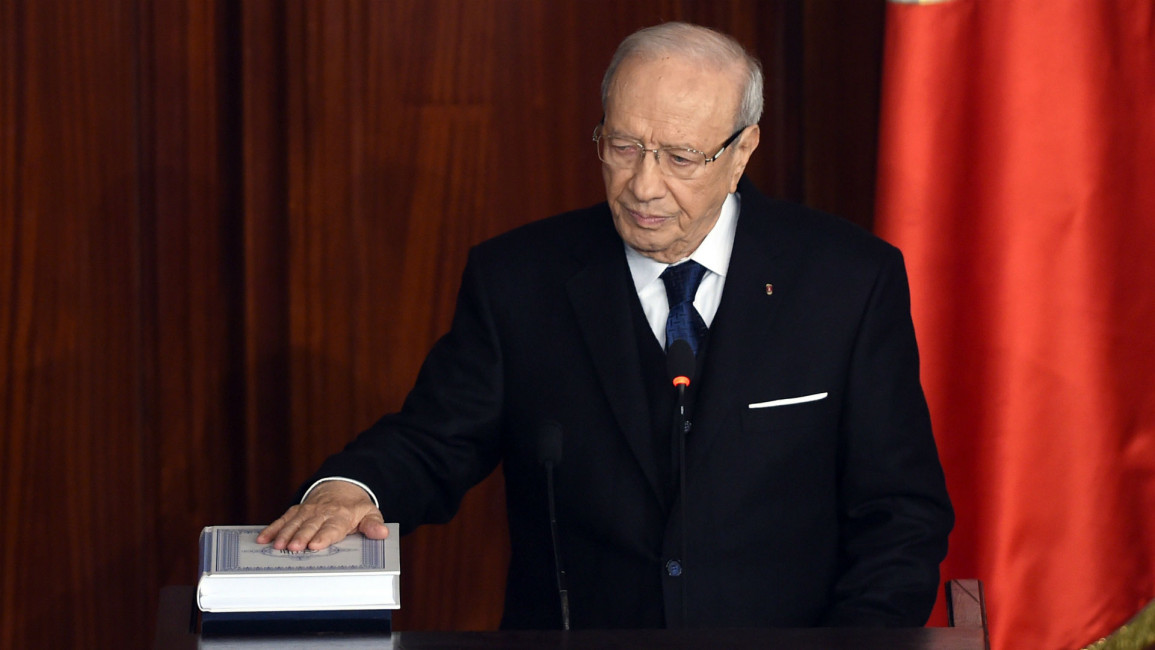Essebsi sworn in, declares national unity key for Tunisia
Beji Caid Essebsi, 88, has been sworn-in as Tunisia’s first freely elected president, and immediately struck a conciliatory tone, declaring that he would be "the president of all Tunisians".
"There is no future for Tunisia without consensus among political parties and members of civil society," Essebsi said after the ceremony.
"There is no future for Tunisia without national reconciliation."
Essebsi is known for his opposition to Islamists, in a country where the moderate Islamist Ennahda party enjoys strong support, and dominated the Tunisia's transitional period following the overthrow of longtime dictator Zine El Abidine Ben Ali in 2011.
Essebsi, himself a veteran of previous regimes, won a presidential run-off against outgoing president Moncef Marzouki on 21 December.
The transition to democracy has been praised internationally, and now political leaders within Tunisia are stressing that the country’s different groupings must work together to overcome the economic and security problems the country faces.
Essebsi's party, Nidaa Tounes, beat Ennahda into second place in the parliamentary elections in October.
Now, one of his first tasks is to instruct his party to form a government – a task made more difficult as Nidaa Tounes were unable to gain an absolute majority, winning 86 of 217 seats.
Ennahda have indicated that they are willing to join a governing coalition.
Challenges ahead
Parliament speaker Mohamed Ennaceur, also a member of Nidaa Tounes, described the oath-taking ceremony as "an exceptional moment in history", yet Essebsi now faces a struggle to move Tunisia forward.
Tunisia's revolution sparked a wave of protest movements across the Arab world, culminating in the removal of autocrats in Egypt, Libya and Yemen, as well as mass protests in Syria and Bahrain.
However, despite the North African country avoiding the kind of unrest that has plagued others in the region, many Tunisians complain that things have gotten worse since Ben Ali’s overthrow.
The economy is struggling to recover from the upheaval of the revolution, and there is now a growing threat from Islamist militants, who recently claimed the assassination of left-wing politicians in 2013.
Essebsi has said that fixing the country's economy was vital in order "to realise the promises of the revolution: dignity, employment, health and regional equality".
Nonetheless, despite the calls for reconciliation, Essebsi is a polarising figure, with many accusing him and his Nidaa Tounes party as being fronts for the return of the former regime.
While Essebsi served in high positions under the regimes of Ben Ali and his predecessor Habib Bourgeiba, Marzouki was an exiled human rights activist, who chose to enter a coalition deal with Ennahda in 2011.
Essebsi accused Marzouki during the election campaign of representing the Islamists, who the octogenarian said had "ruined" the country since the revolution.
Tunisian newspapers are now urging the new leadership to put that animosity behind them, and uphold the dreams of the revolution.
"All the vicissitudes of history during the past 40 years show the importance of respect for human rights," Le Temps said.
It said there was "no question of backtracking on respect for freedoms".
La Presse said Tunisia’s experience showed that "democracy is compatible with Arab-Muslim culture".
It added: "Now we must demonstrate that this democracy can be turned into economic opportunity and prosperity."



